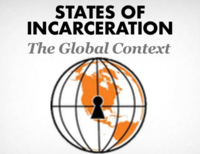FOR IMMEDIATE RELEASE
Contact:
Peter Wagner, Assistant Director
Prison Policy Initiative
(413) 527-0845
Prisoner census counts skew population and political representation: Impact on communities to be examined at Census Bureau symposium
Washington, DC (February 28, 2004) - The Prison Policy Initiative, an organization that conducts research and advocacy on incarceration policy, today announced that on March 5, 2004 Assistant Director Peter Wagner will address attendees of the Census Bureau Symposium on how Census counts of prisoners impact legislative redistricting. In his presentation, Wagner will discuss how the Census Bureau's practice of counting the nation's mostly urban prisoners as residents of the rural towns that host prisons creates an artificial increase in the population of prison-hosting rural areas. As a result, rural districts gain additional representation in state legislatures based on imported prisoner-constituents who are ultimately unable to vote.
"America's Scorecard: The Census in an Ever-Changing Nation" is a national conference organized by the Census Bureau's History Office concerning the role of the Census in the nation's growth and development. Wagner will speak on the 1:15 p.m. panel entitled "Apportionment and Fair Representation."
Wagner's research demonstrates that where the population is counted is as important as the fact that it is counted. Prisoners tend to be drawn from a small number of urban communities and incarcerated in distant rural prisons. In New York State, for example, 66% of prisoners are from New York City, but 91% of these prisoners are incarcerated in upstate New York prisons.
"Miscounting prisoners changes the way that state and local legislative districts are drawn," said Wagner. "This census policy creates an inaccurate picture of our communities, and state legislatures that rely on Census data likely violate the constitutional principle of one person one vote."
Peter Wagner, J.D., is assistant director of the Prison Policy Initiative and an Open Society Institute Soros Justice Fellow. A 2003 graduate of the Western New England College School of Law, he is the author of "Importing Constituents: Prisoners and Political Clout in New York" (2002), the first state analysis of the impact of prisoner enumeration policies on legislative redistricting. In 2003, he wrote "The Prison Index: Taking the Pulse of the Crime Control Industry," a statistical reference book for criminal justice practitioners, and has published articles on subjects such as racial disparities in criminal justice, felon disenfranchisement, and comparative international incarceration. Wagner has previously spoken at Harvard University, Yale Law School, the University of Buffalo Law School, and at a number of national criminal justice conferences.
The Apportionment and Fair Representation panel at the Census Bureau Symposium will take place on Friday, March 5 at 1:15 p.m. at the:
Woodrow Wilson International Center for Scholars,
Ronald Reagan Building,
1300 Pennsylvania Avenue NW,
Washington, DC.
About the Prison Policy Initiative
The Cincinnati-based Prison Policy Initiative (PPI) conducts research and advocacy on incarceration policy. Its work starts with the idea that the racial, gender and economic disparities between the prison population and the larger society represent the grounds for a democratic catastrophe. PPI's concept of prison reform is based not only in opposition to a rising rate of incarceration, but in the search for a lasting solution to pressing social problems superior to temporarily warehousing our citizens in prisons and jails. For more information about PPI or prison policy in general, visit https://www.prisonpolicy.org.
For more information including full color maps illustrating how Census counts of prisoners distort legislative redistricting, see https://www.PrisonersoftheCensus.org
###



